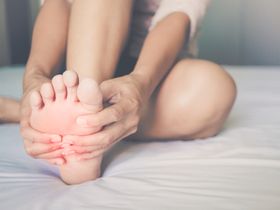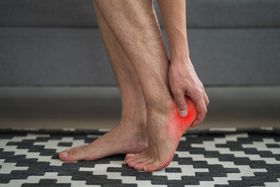Can Acupuncture Effectively Treat Plantar Fasciitis?
Learn more about how plantar fasciitis can be treated using acupuncture, the efficacy thereof, and other conservative strategies to manage this condition.
Updated February 17, 2023.
Heel pain experienced when taking your first steps in the morning is commonly reported in those suffering from plantar fasciitis. Plantar fasciitis is characterized by inflammation in the fascia that maintains your foot arch, usually aggravated by overuse or improper footwear, among other causes. There are various methods to relieve plantar fasciitis, including massaging sore heels, orthotics, and acupuncture to help with heel pain.
Acupuncture is considered a safe and effective way to manage plantar fasciitis associated with heel pain in people over 40.
Acupuncture is minimally invasive, with the health practitioner targeting areas of pain and tension to relieve pain. Acupuncture can also be used on the muscles of the lower leg with the same effect to ease tension that could be aggravating the plantar fascia in your feet.
How Does Acupuncture Treat Plantar Fasciitis?
By inserting the thin acupuncture needles into specific target areas of the foot and calf muscle, a reduction in pain and inflammation in the fascia is reported.
Faster healing of the fascia takes place due to increased blood flow, followed by a release of anti-inflammatory substances to alleviate pain.
Fibroblast stimulation, essential for tissue healing, is stimulated through acupuncture. Moreover, acupuncture has been said to lower one's perception of pain and regulate the body's pain response.
Studies have shown it takes roughly 4–8 weeks for a significant reduction in pain to be seen using acupuncture.
Other Conservative Treatments for Plantar Fasciitis
Acupuncture can be done in conjunction with other conservative home remedies for the best overall results. Other conservative methods to manage plantar fasciitis include:
- Stretching the foot and calf muscles
- Massaging pressure points in the heel and foot
- Increasing your intake of herbs for plantar fasciitis such as ginger and turmeric
- Orthotic insoles cushion the foot and promote even weight distribution
- Not wearing shoes that apply pressure to the heel area, like shoes with a raised heel
- Using ice to reduce pain and inflammation should you experience a flare-up in your symptoms
Related Articles

What Causes Middle Foot Pain and How to Get Rid of It
Upstep Staff
January 26, 2024

How to Massage Plantar Fasciitis: Best Techniques and Tools
Babafemi Adebajo
February 17, 2023

Eat For Your Feet
Upstep Staff
October 15, 2024

Causes of Burning Feet
Babafemi Adebajo
December 17, 2024

3 Best Insoles for Walking All Day—Custom-Made by Top Podiatrists
Babafemi Adebajo
December 9, 2024
Related Posts
Babafemi Adebajo
How to Massage Plantar Fasciitis: Best Techniques and Tools
Dr. Pooja Gajare
Do Orthotic Insoles Work for Heel Pain?
Babafemi Adebajo



